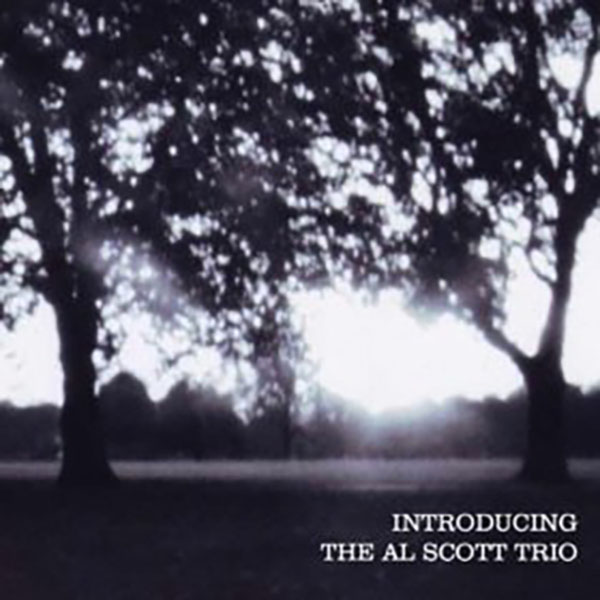
by Ian Mann
May 23, 2012
/ ALBUM
A good calling card for the trio that shows much promise.
The Al Scott Trio
“Introducing The Al Scott Trio”
Sorry folk fans, this is not Al Scott the legendary producer of the Levellers and Oysterband, regular live performer on guitar and bass with the latter and honorary “sixth Oyster”. Instead this is young jazz pianist Alistair Scott, originally from Manchester but now living in Dalston, London.
Al originally contacted Tim Owen with a view to having his trio’s début album reviewed on Tim’s new Dalston Sound website. On hearing the album Tim thought Al’s brand of Bill Evans influenced pianism would be more suited to the sensibilities of The Jazzmann rather than the more improv/experimental musical areas covered by Dalston Sound.
Scott gained a Jazz degree from Middlesex University and currently undertakes session work and teaching as well as leading his jazz trio and performing in other groups in a variety of styles and contexts. He has a strong pop sensibility, first influenced by Michael Jackson and Quincy Jones, but Bill Evans remains his touchstone for the trio. Other acknowledged jazz influences include Miles Davis, Herbie Hancock, John Taylor, Kenny Wheeler, Victor Feldman, Freddie Hubbard, Charles Mingus, Tomasz Stanko, Roy Ayers & Patrice Rushen.
Scott’s colleagues in his jazz trio are double bassist Henry Gilbert and drummer Marco Quarantotto. The trio formed a little over two years ago and perform regularly on the London circuit. Their first, self released, album features pieces by Thad Jones, Miles Davis and, of course, Bill Evans, alongside three Scott originals.
Proceedings commence with the trio’s take on Thad Jones’ “When A Child Is Born” introduced by Scott at the piano and subsequently featuring Quarantotto’s nimbly brushed drums and Gilbert’s agile but richly resonant bass. Scott imbues Jones’ gospel tinged tune with something of Evans’ famous lyrical touch.
“The Feeling” is a pleasing Scott original that combines his Evans inspired lyricism with a more groove based approach, it’s perhaps no coincidence that the trio sometimes use the abbreviation AST. The piece alternates catchy hooks and grooves with more lyrical episodes. It’s a piece that brings Scott’s numerous jazz and pop influences together.
Evans’ “Time Remembered” begins with a delightful passage of spacious solo piano before Scott gently increases the pace and ushers in the bass and drums. Gilbert’s resonant grooves and Quarantotto’s chattering brushwork frame Scott’s darting improvisation on Evans’ theme. Evans remains a huge influence on contemporary pianists and this joyous homage makes for hugely enjoyable listening.
The title of Scott’s “Northern Smiles” is presumably a nod to his Mancunian roots ( is he perchance related to drummer Jon Scott?) but also implies a homage to Keith Jarrett (who penned a tune entitled “Southern Smiles”) or maybe even Gwilym Simcock whose own “Northern Smiles” (from his ACT solo piano album, the Mercury nominated “Good Days at Schloss Elmau”) is a direct reply to the Jarrett piece. In any event Scott’s composition begins with an arresting solo bass intro from the excellent Gilbert before the shimmer of Quarantotto’s cymbals and Scott’s rich piano chording transport the tune somewhere else. Scott’s tune exhibits something of the melodic sense of both Jarrett and Simcock and Gilbert’s contribution is superb throughout. Scott’s solo has something of the exuberance of early Jarrett as it flows joyously.
Another Scott original, “It’s A Start”, begins more pensively and shows the pianist once more combining lyricism with strong melodic hooks and grooves. Quarantotto offers sympathetic support, first with brushes and later with sticks as the tune gathers momentum. The closing section is particularly energetic with Quarantotto relishing the chance to demonstrate his chops. The interplay between the trio members impresses throughout, whatever the pace.
The album closes with the trio’s interpretation of “Nardis”, credited here to both Miles Davis and Bill Evans. It’s a tune that’s something of a favourite for improvisers, particularly pianists (I love Richie Beirach’s version on the 1974 ECM album “Eon”). Scott and his colleagues do the tune justice with the pianist first soloing expansively above forceful, yet sympathetic, drums and muscular but supple bass. The second half of the piece is more lyrical and impressionistic as Scott and his colleagues offer two different approaches within the same tune.
“Introducing…” doesn’t pull up any trees but it’s a good calling card for the trio and shows much promise. Scott’s originals exhibit a strong melodic content, his pop sensibility does his writing no harm at all, and the way he varies the dynamics within the course of a single tune is impressive. All three of his original compositions have something worthwhile to say. Despite his self acknowledged debt to Bill Evans it would be good to see the trio concentrating entirely on original material next time round. Gilbert and Quarantotto impress with their contributions and the album suggests that jazz fans in the trio’s North London catchment area could do themselves a favour by checking the trio out. Scott has this to say about their next scheduled live appearance;
Ajani Grill & Jazz Bar - Friday 29th June
The Trio play their first gig at Ajani’s Jazz Restaurant.
I’ve played there previously in a duo context with Henry on bass.
This is an intimate venue which has warm vibes to it.
Al Scott - Piano, Henry Gilbert - Double Bass, Marco Q - Drums.
AJANI BAR
289 Hornsey Road
London
N19 4HN
Free Entry(for diners)
0207 272 5566
More at http://www.al-scott.co.uk
blog comments powered by Disqus